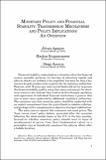| dc.contributor.author | Aguirre R., Álvaro | |
| dc.contributor.author | Brunnermeier, Markus Konrad | |
| dc.contributor.author | Saravia, Diego | |
| dc.date.accessioned | 2019-11-01T00:08:31Z | |
| dc.date.available | 2019-11-01T00:08:31Z | |
| dc.date.issued | 2019 | |
| dc.identifier.isbn | 978-956-7421-60-2 | |
| dc.identifier.uri | https://hdl.handle.net/20.500.12580/3864 | |
| dc.description | Financial stability understood as a situation when the financial system smoothly performs its function of allocating capital and adverse shocks are unlikely to be amplified has been for long a key concern for policymakers and in particular for monetary authorities. However until 10 years ago most central banks did not try to pursue the financial stability goal by using their main instrument the shortterm interest rate. Instead they tried to do this through regulation and supervision of individual financial institutions a process that was in most cases conducted by additional regulatory authorities. | |
| dc.format | .pdf | |
| dc.format.extent | Sección o Parte de un Documento | |
| dc.format.medium | p. 01-11 | |
| dc.language.iso | eng | |
| dc.publisher | Banco Central de Chile | |
| dc.relation.ispartof | Series on Central Banking Analysis and Economic Policies no. 26 | |
| dc.rights | Attribution-NonCommercial-NoDerivs 3.0 Chile | * |
| dc.rights.uri | http://creativecommons.org/licenses/by-nc-nd/3.0/cl/ | * |
| dc.subject | POLÍTICA MONETARIA | es_ES |
| dc.subject | ESTABILIDAD ECONÓMICA | es_ES |
| dc.subject | BANCOS CENTRALES | es_ES |
| dc.title | Monetary policy and financial stability: transmission mechanisms and policy implications: an overview | |
| dc.type.doc | Artículo | |
| dc.file.name | BCCh-sbc-v26-p001_011 | |


